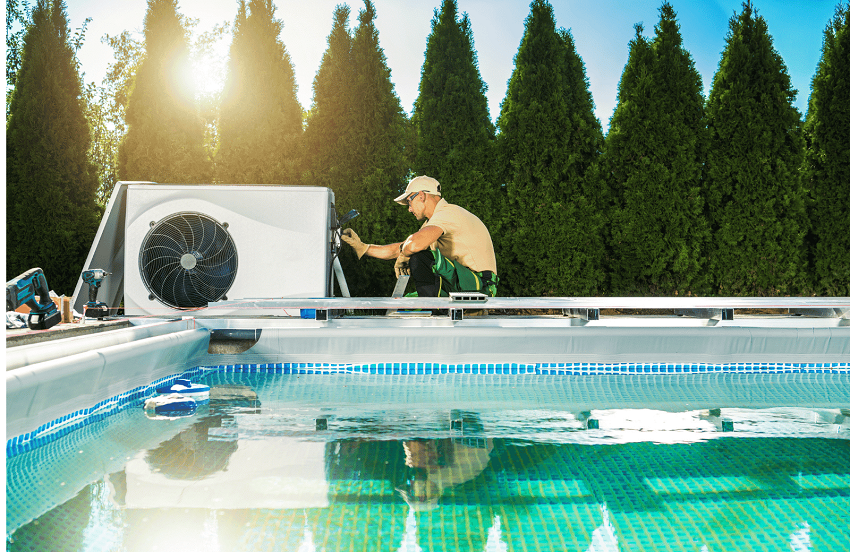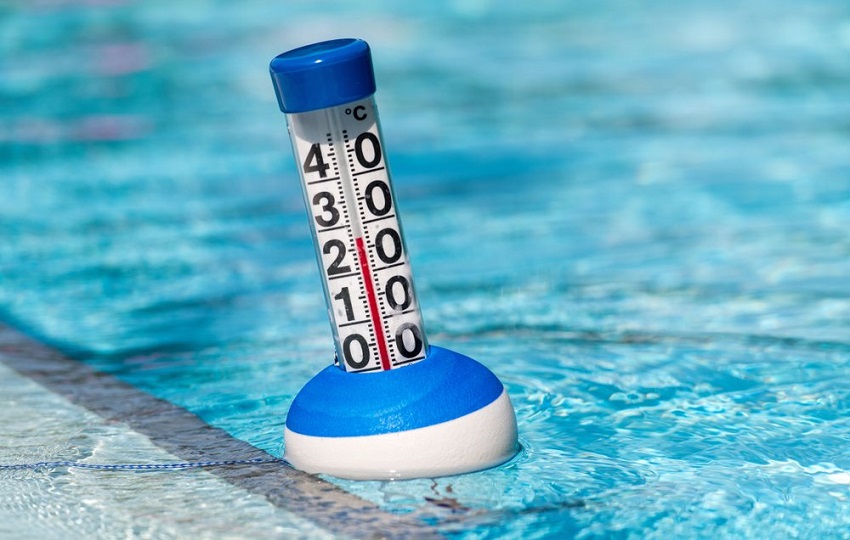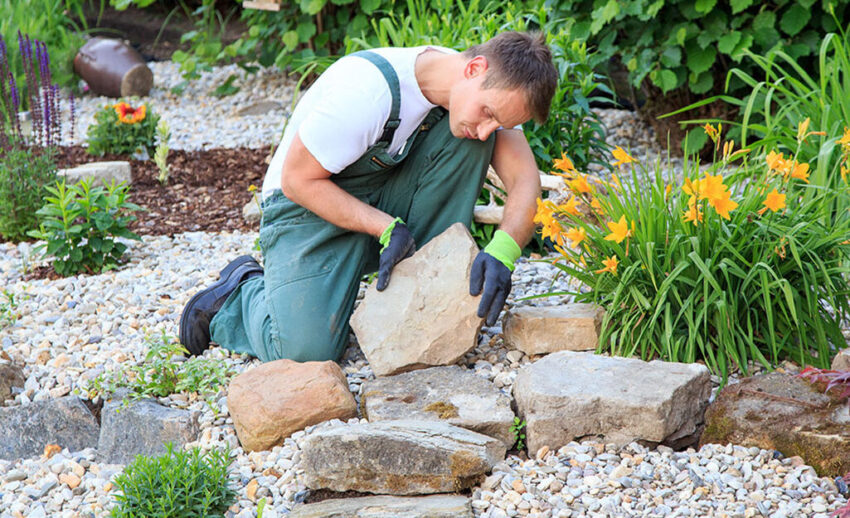Pools provide a refreshing oasis during hot summer days, but what if the water is too chilly for a comfortable swim? One of the most common questions pool owners ask is, “how long does it take to heat a pool up?” The answer depends on several factors, including the size of the pool, the type of heating system used, and the surrounding environmental conditions. In this article, we will explore how long does it take to heat a pool.
Factors Affecting Pool Heating Time
Size and Volume of the Pool
The size and volume of your pool play a significant role in determining how long it takes to heat the water. Larger pools require more energy and time than smaller ones to reach the desired temperature. The pool’s surface area also affects heat loss, so the bigger the pool, the more heat is required to compensate for the heat dissipation.
Ambient Temperature
The ambient temperature, or the temperature of the surrounding environment, influences pool heating time. If you live in a region with a warmer climate, it will take less time to heat your pool. However, if you reside in a colder area, it might take longer as the heating system needs to work harder to raise the water temperature.
Type of Heating System
The type of heating system you choose for your pool determines the heating time. Let’s explore some of the common heating methods used for pools:
Understanding BTUs and Heating Rates
Before we delve into specific heating methods, it’s essential to understand BTUs (British Thermal Units) and heating rates. BTUs measure the heat required to raise the temperature of one pound of water by one degree Fahrenheit. The higher the BTU rating of a heating system, the faster it can heat the pool.
Now, let’s explore different pool heating options:
Solar Pool Heating
Solar pool heating systems are an eco-friendly and cost-effective way to warm your pool water. They utilize the sun’s energy to heat the water, reducing your reliance on traditional energy sources. Here’s how solar pool heating works:
How Solar Pool Heating Works
Solar heating systems consist of solar panels or collectors installed on your roof or near the pool area. These panels contain tubes or channels through which pool water circulates. As the water passes through the panels, it absorbs heat from the sun, raising its temperature. The heated water then returns to the pool, gradually increasing its temperature.
Pros and Cons of Solar Heating
Solar pool heating offers several advantages. It harnesses renewable energy, reduces utility costs, and has minimal environmental impact. However, solar heating systems may have limitations in colder climates and require adequate sun exposure for optimal performance.
Heat Pumps for Pool Heating
Heat pumps are another popular option for pool owners seeking efficient heating solutions. These devices extract heat from the air or ground and transfer it to the pool water. Here’s how heat pumps work:
How Heat Pumps Work
Heat pumps use electricity to operate and work similarly to air conditioners but in reverse. They extract heat from the surrounding air or ground and transfer it to the pool water. Heat pumps are highly energy-efficient and can maintain a consistent water temperature. However, they may be more expensive upfront compared to other heating methods.
Pros and Cons of Heat Pumps
Heat pumps offer excellent energy efficiency, consistent heating, and a longer lifespan than gas heaters. They are also environmentally friendly as they produce fewer greenhouse gas emissions. However, they may not be as effective in extremely cold climates and may have a higher initial cost.
Gas Pool Heaters
Gas pool heaters are known for their rapid heating capabilities, making them a popular choice for those who want quick results. Here’s how gas pool heaters work:
How Gas Pool Heaters Work
Gas heaters use natural gas or propane to generate heat for the pool water. A gas burner ignites and heats up a combustion chamber, where water flows through copper coils. As the water passes through the coils, it absorbs the heat from the burning gas, returning to the pool at a higher temperature.
Pros and Cons of Gas Heaters
Gas pool heaters offer rapid heating, allowing you to enjoy your pool in a short amount of time. They are also effective in colder climates and provide consistent heat output. However, gas heaters are less energy-efficient than other options and can be more expensive.
Electric Pool Heaters
Electric pool heaters utilize electric resistance elements to warm the pool water. Here’s how they work:
How Electric Pool Heaters Work
Electric heaters contain heating elements made of resistant wire coils. When electricity passes through these coils, they generate heat, warming the water as it flows through the heater. Electric heaters are relatively easy to install and maintain but may have higher operating costs depending on electricity rates.
Pros and Cons of Electric Heaters
Electric pool heaters are known for their simplicity and ease of use. They can efficiently maintain the desired water temperature and have lower upfront costs than other heating methods. However, they may consume more electricity and be less efficient in heating large pools.
Other Factors to Consider
Apart from the heating system and pool characteristics, several other factors can impact the time it takes to heat your pool. Let’s explore some additional considerations:
Initial Pool Temperature
The starting temperature of your pool plays a role in determining the heating time. If your pool water is already relatively warm, reaching the desired temperature will require less energy and time than a pool with colder water.
Desired Temperature
The temperature you wish to achieve also affects the heating time. If you aim for a moderately warm pool, it will heat faster compared to a pool set to a higher temperature.
Weather Conditions
Weather conditions like wind speed and humidity can influence pool heating time. Wind can cause heat loss through evaporation, while humidity affects how water evaporates from the pool’s surface.
Location and Sun Exposure
The location of your pool and its exposure to the sun can significantly impact heating time. Pools in areas with ample sunlight and minimal shading will heat faster than those in shady or obstructed locations.
Tips for Efficient Pool Heating
To maximize the efficiency of your pool heating system and reduce overall heating time, consider the following tips:
Proper Insulation
Ensure that your pool is properly insulated to minimize heat loss. Insulation can include pool covers, solar blankets, and insulated pool walls.
Using a Pool Cover
A pool cover effectively reduces heat loss and retains the warmth generated by your heating system. Covering your pool when it’s not in use can significantly reduce the time and energy required to heat the water.
Timing and Scheduling
If possible, plan your pool heating based on anticipated usage. By scheduling your heating system to turn on a few hours before you use the pool, you can ensure that the water reaches the desired temperature in time.
Maintenance and Upkeep
Regular maintenance and upkeep of your pool and heating system are essential for optimal performance. Keep your heating system clean, check for leaks or malfunctions, and ensure proper circulation and filtration.
In conclusion, the time it takes to heat a pool depends on various factors, including the pool’s size, the type of heating system used, and the surrounding conditions. Solar pool heating, heat pumps, gas heaters, and electric heaters are common options for pool owners. Each method has pros and cons, and choosing the right one depends on your needs and preferences. Factors like initial pool temperature, desired temperature, weather conditions, and location can also influence heating time. Considering these factors and implementing energy-efficient practices, you can enjoy a comfortably heated pool throughout the swimming season.





